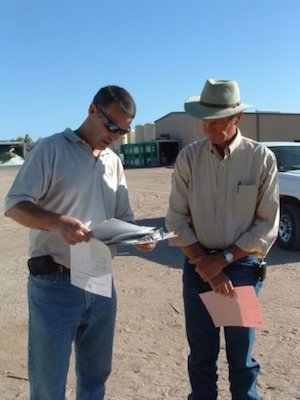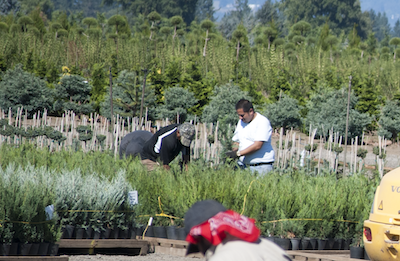What are my responsibilities as a crop advisor?

As a crop advisor, you may perform many tasks related to the production of agricultural plants that will make you fall under the scope of the WPS. These tasks include such things as assessing pest numbers/damage, pesticide distribution, and/or evaluating the status, condition, or requirements of agricultural plants. Often these tasks entail working in pesticide-treated areas that are subject to WPS requirements.
It's your responsibility to understand the requirements, follow instructions to avoid restricted areas, wear the required protective equipment, and take steps to avoid bringing pesticide residues home. Children, pregnant women, and the elderly are more sensitive to pesticide exposures than other adults.
View More
View Less
First, are you considered a "worker" or a "handler" under the WPS? The difference is whether you conduct crop-advising tasks in a pesticide-treated area during or after a restricted-entry interval (REI).
- If you perform crop-advising tasks during the REI, you are considered a pesticide handler. Your employer must provide protections required for handlers.
- If you perform crop-advising tasks after the REI, but within 30 days of the REI, you are considered an agricultural worker. Your employer must provide protections required for agricultural workers.
- If you perform crop-advising tasks more than 30 days after the end of the REI, the WPS probably doesn't apply to your work.
- Crop advisors are not permitted to perform crop-advising tasks during a pesticide application.
Second, are you considered a "certified" crop advisor or a "non-certified crop advisor"? The difference is whether you have completed other coursework that includes the same training topics required by the WPS.
- Crop advisors that are certified or licensed under the National Alliance of Independent Crop Consultants (NAICC), or a similar program with approval from the State or Tribal Agency responsible for pesticide enforcement, are considered “certified” crop advisors under the Worker Protection Standard (WPS).
- In order to qualify, the crop-advisor’s certification/training must include all of the same training topics required for WPS handler training.
- If you are not certified/trained as described above, you are considered a "non-certified crop advisor."
Third, who is your employer? This determines who will provide you with information about the pesticide applications in your workplace.
- You might be self-employed as an independent contractor.
- You might be employed by an agricultural establishment directly. If that's the case, you might only perform crop-advising tasks on that establishment.
- You might be employed by a company that provides crop-advising services to more than one agricultural establishment. If that's the case, that company is considered a "commercial pesticide handler establishment" (CPHE) under the WPS.
Learn more about the protections required in your role as a Worker or Handler
Required Protections for Crop Advisors Performing Activities as Handlers
Unless you are a self-employed crop advisor, your employer must provide you with the applicable handler protections (see below) if you perform crop-advising tasks during an REI. These include handler training, personal protective equipment (PPE), access to decontamination supplies, emergency assistance, and special instructions. There may be additional requirements if you are employed directly by an agricultural establishment.
Pesticide Safety Training
- Certified crop advisors are exempt from WPS training requirements as long as their other licenses/credentials are current.
- Non-certified crop advisors must receive WPS handler training before performing crop advisor tasks during an REI.
Personal Protective Equipment (PPE)
- Certified crop advisors are exempt from label-required PPE for handlers. You qualify to make your own PPE determinations and substitutions as you see fit.
- Non-certified crop advisors must wear some PPE when performing crop-advising tasks during an REI. Your employer is required to provide the label-required PPE for pesticide handlers unless the exception below applies.
- The pesticide application has been complete for 4 hours, and
- You only perform crop advising tasks during the REI, and
- You do not enter treated areas until the inhalation exposure level on the label is met OR the ventilation criteria on the label are met. When no ventilation restrictions are listed on the label for enclosed space production, use this table to determine the ventilation requirements.
- The PPE listed on the label for early-entry workers, or
- Cloth coveralls, shoes plus socks, and waterproof gloves. Additionally, eye protection must be worn if required by the label for handlers of that product.
Decontamination Supplies
- Certified crop advisors can determine their own needs for decontamination supplies, and their employers are not required to provide them.
- Non-certified crop advisors must be provided with the decontamination supplies required for handlers under the WPS.
Emergency Assistance
- Certified crop advisors can determine their own needs for emergency assistance, and their employers are not required to provide it.
- Non-certified crop advisors must be provided with the same emergency assistance required for handlers under the WPS.

Required Protections for Crop Advisors Performing Activities as Workers
If you are a non-certified crop advisor and you conduct crop advising activities in pesticide treated areas after the REI has expired but within 30 days of a pesticide application or REI, then you are considered a worker under the WPS.
Pesticide Safety Training
- Non-certified crop advisors must receive
WPS worker training before
performing crop advisor tasks in a treated area.
Personal Protective Equipment (PPE)
- Certified crop advisors are exempt from label-required PPE for
handlers. - There are no requirements for workers to wear PPE when working in
treated areas after an REI has ended, unless the label says
otherwise.
Decontamination Supplies
- Certified crop advisors can determine their own needs for
decontamination supplies, and their employers are not required to
provide them. - Non-certified crop advisors must be provided with the
decontamination supplies required for workers under the WPS.
Emergency Assistance
- Certified crop advisors can determine their own needs for
emergency assistance, and their employers are not required to provide
it. - Non-certified crop advisors must be provided with the same
emergency assistance required for workers under the WPS. If you think
a pesticide exposure is making you sick, your employer must make sure
you receive emergency medical assistance.
View More
View Less
Learn More:
How and when will I be informed about the pesticide applications in my workplace?

Regulatory Guidance
Browse brief guides about protections for workers and handlers, the AEZ, posting, PPE, exemptions, training, respirators, and more, in English and Spanish.